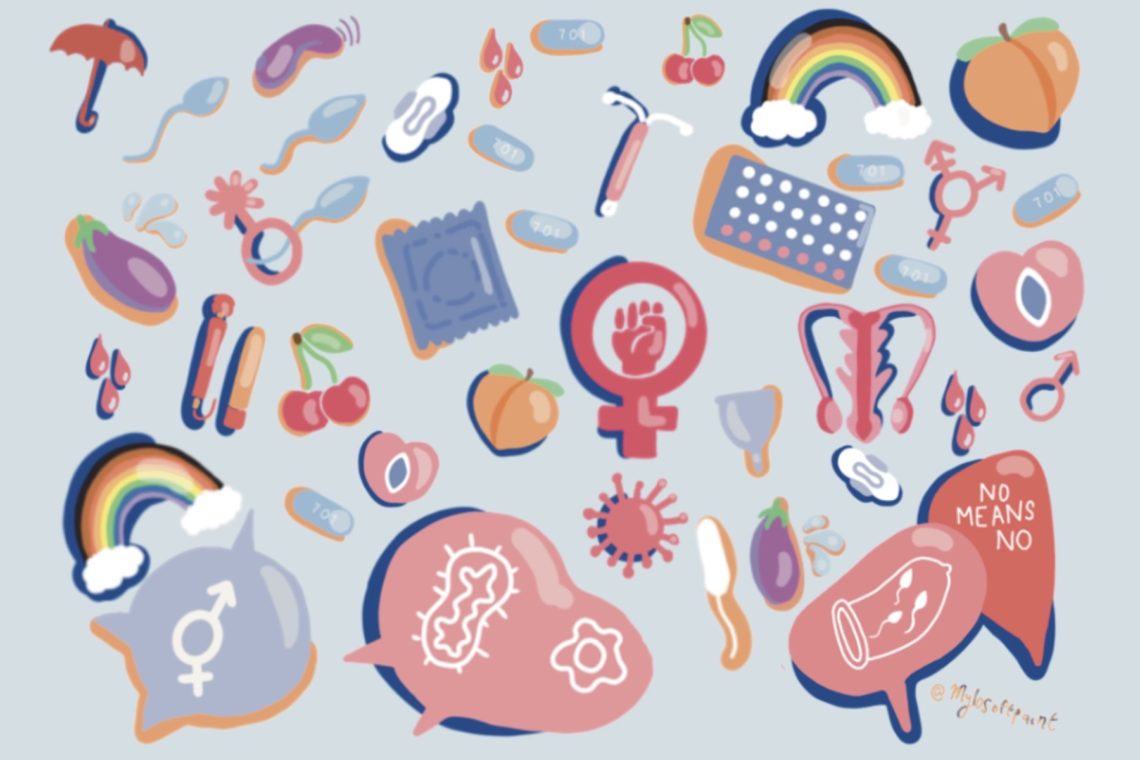Written By: Jillian Schneidman (she/her).
Edited By: Camille Zeitouni (she/her).
I’ve been a healthcare student for the past 5 years. Throughout, I have experienced a variety of courses, teachers, and topics. From the occupational therapy program to the medical school curriculum, there has been one clear and consistent theme: a lack of sexual health education.
As each semester wrapped up, I kept thinking to myself that eventually these topics would and had to be brought up – how could they not?
Growing up, I can remember the lack of conversations I had with my own doctor about my sexuality and my sexual health. Even now, as a 24-year old cis woman, the only discussion about sex during my last visit to the doctor was: (a) “are you having sex?” and (b) “you are using condoms, right?”. These narrow-minded conversations always left me incredibly frustrated, and with a handful of sexual health questions gone unanswered and ignored. Yet, I would convince myself that this was just my own personal experiences and not something that was encountered by many.
Learning about sexual health within the medical curriculum was equally as upsetting. Although we have a four-week block dedicated to reproductive and sexual health, the variety of topics discussed are scarce. The majority of our classes are spent learning about reproductive physiology, basic contraception, and sexually transmitted infections. While these topics are important for any future physician to understand, it translates to limited time spent on other equally important subjects. We have no hours talking about sexual pleasure, one-hour discussing sexual dysfunction, and a couple of hours talking about a number of women’s sexual health conditions. To top it all off, out of the entire four-weeks, we have one lecture dedicated to learning about transgender health. And, the presentations devoted to these topics, if any, are incredibly basic and barely scratch the surface.
Wondering if all of this was solely my own experience within the healthcare curriculum, I did a quick search on the internet and was distraught by what I had found. A tremendous amount of evidence demonstrated the lack of conversations about sexual health within the patient-practitioner encounter. Even more so, a number of studies substantiated the extent to which healthcare practitioners are not adequately trained within the curriculum to tackle a variety of sexual health topics.
Here is what I learnt:
According to a survey among obstetricians and gynecologists within the United States, fewer than 2/3rds routinely ask about sexual activity, only 40% inquire about sexual problems, and 28.5% ask about sexual satisfaction (1). Moreover, in another report, although 90% of healthcare practitioners agreed that addressing sexual issues ought to be part of the holistic care for patients, only 6% actually initiated sexual health discussions on a frequent basis (2). When sexual health is talked about, a study showed that the average physician discusses the topic with adolescents for a mere 36 seconds per visit (3). These absent dialogues within the healthcare encounter not only leave patients underdiagnosed and undertreated, but they further stigmatize these topics already seen as taboo in our society.
The healthcare curriculum is not any better in attempting to improve on these above statistics. Among many medical schools, there is little to no attention devoted to topics of sexual function, sexual dysfunction, and female sexuality (4). In one study, 42-62% of medical students found that the training they receive on sexuality within medical school to be inadequate (5). In another report, it was determined that medical and nursing students in Canada and the U.S. receive on average 3.5 hours of content specific to 2SLGBTQIA+ populations (6).
This lack of education by the curriculum in addressing these topics leads to a further discomfort among healthcare practitioners when sexual health is brought up with their patients. Doctors describe feeling “reluctant”, “reserved”, or “uncomfortable” when talking about sexual health (7). Likewise, healthcare practitioners indicate particular discomfort when discussing sexual health conditions with patients of gender, racial, or ethnic groups that differ from their own (8).
The lack of conversations, comfort, and training among healthcare practitioners with regards to sexual health needs to be addressed.
The consequences on patients and communities are very real – and very devastating. According to a poll done by the Harvard T.H. Chan School of Public Health, nearly 1/6th of 2SLGBTQIA+ Americans have experienced discrimination at the doctor’s office or in another healthcare setting (9). Furthermore, it takes people with vaginas, on average, 9 years to be diagnosed with endometriosis (10), 2 years to be diagnosed with polycystic ovary syndrome (11), and 3 years to be diagnosed with uterine fibroids (12).
These numbers and statistics need to be better. We need to be better. We have to recognize these gaps, educate ourselves, and speak up to the system in order to affect change within our own practice and our curriculum. As current and future healthcare practitioners, we have a moral obligation to our patients and our professions to be educated, up-to-date, and comfortable on topics related to sexual health and well-being.
With our organization, Sex[M]ed, we hope to provide some window of education on many of these topics not discussed within the healthcare curriculum. We strive to foster safer spaces for future patients to discuss their concerns with their healthcare practitioners and increase the number of conversations being had around sexual health. We encourage you to reflect on your own experience with sexual health topics, whether that be in the context of health care or not, and on how we can all contribute moving forward to improve these statistics and our patients’ experiences of sexual health care.
References:
1. Sobecki JN, Curlin FA, Rasinski KA, Lindau ST. What We Don’t Talk About When We Don’t Talk About Sex: Results of a National Survey of US Obstetrician/Gynecologists. The Journal of Sexual Medicine. 2012;9(5):1285-94.
2. Haboubi N, Lincoln N. Views of Health Professionals on Discussing Sexual Issues with Patients. Disability and Rehabilitation. 2003;25(6):291-6.
3. Alexander SC, Fortenberry JD, Pollak KI, Bravender T, Davis JK, Østbye T, et al. Sexuality Talk During Adolescent Health Maintenance Visits. JAMA pediatrics. 2014;168(2):163-9.
4. Shindel AW, Parish SJ. CME Information: Sexuality Education in North American Medical Schools: Current Status and Future Directions (CME). The Journal of Sexual Medicine. 2013;10(1):3-18.
5. Wittenberg A, Gerber J. Recommendations for Improving Sexual Health Curricula in Medical Schools: Results from a Two‐Arm Study Collecting Data from Patients and Medical Students. The Journal of Sexual Medicine. 2009;6(2):362-8.
6. Pratt-Chapman ML. Implementation of Sexual and Gender Minority Health Curricula in Health Care Professional Schools: a Qualitative Study. BMC Medical Education. 2020;20:1-14.
7. Rabathaly PA, Chattu VK. An Exploratory Study to Assess Primary Care Physicians’ Attitudes Toward Talking About Sexual Health with Older Patients in Trinidad and Tobago. Journal of Family Medicine and Primary Care. 2019;8(2):626.
8. Gott M, Galena E, Hinchliff S, Elford H. Opening a Can of Worms: GP and Practice Nurse Barriers to Talking About Sexual Health in Primary Care. Family Practice. 2004;21(5):528-36.
9. Powell A. The Problems with LGBTQ Health Care. The Harvard Gazette. 2018.
10. Ballweg ML. Impact of Endometriosis on Women’s Health: Comparative Historical Data Show that the Earlier the Onset, the More Severe the Disease. Best Practice & Research Clinical Obstetrics & Gynaecology. 2004;18(2):201-18.
11. Gibson-Helm M, Teede H, Dunaif A, Dokras A. Delayed Diagnosis and a Lack of Information Associated with Dissatisfaction in Women with Polycystic Ovary Syndrome. The Journal of Clinical Endocrinology & Metabolism. 2017;102(2):604-12.
12. Ghant MS, Sengoba KS, Vogelzang R, Lawson AK, Marsh EE. An Altered Perception of Normal: Understanding Causes for Treatment Delay in Women with Symptomatic Uterine Fibroids. Journal of Women’s Health. 2016;25(8):846-52.


